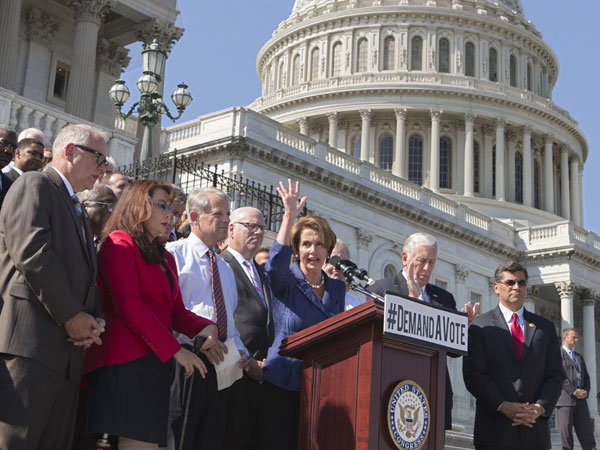For PH, US debt deal offers little comfort

House Democrats rally behind Minority Leader Nancy Pelosi, D-California, center, as they tell the Republican majority they want a vote on reopening the government without clamping any restrictions on President Barack Obama’s health care law, at the Capitol in Washington, Wednesday, Oct. 2, 2013. Although the US Congress narrowly averted a disaster that would have sent the global economy on a downward spiral, the Philippines’ top economic managers said that the global economy was not out of the woods yet. AP PHOTO/J. SCOTT APPLEWHITE
The United States Congress narrowly averted a disaster that would have sent the global economy on a downward spiral when it concluded a short-term deal to pay for the resumption of public services, allowing the US to avoid a debt default.
But the Philippines’ top economic managers said that the global economy was not out of the woods yet. They said emerging markets should use this reprieve to make their own adjustments.
“We should not treat this as an open-ended extension of peace time,” said Diwa Guinigundo, Deputy Governor of the Bangko Sentral ng Pilipinas (BSP).
In a statement to reporters, Guinigundo said the US Congress approved late Wednesday night an increase in the country’s legal borrowing limit. It was able to put off “what otherwise could have been a financial conflagration.”
The government of the world’s largest economy would have reached its previous borrowing limit, also known as debt ceiling, on Oct. 17. The US government currently owes $16.7 trillion.
Article continues after this advertisementHad the debt ceiling been reached, the US government would not have been able to settle maturing US treasury notes—the world’s most traded security.
Article continues after this advertisementBSP officials earlier this month said that a default on US treasuries would have sent the world economy into a recession deeper than the one it faced in 2008.
The deal between the Democrats in the US Senate and House Republicans also ended a 16-day shutdown of the Federal government, which was brought on by Congress’ failure to pass legislation to fund state services.
“The US should look at a more permanent solution to shield the world economy and financial markets from its domestic political squabbles,” Finance Secretary Cesar V. Purisima said in a text message.
Budget Secretary Florencio Abad likewise said there was still a need for a long-lasting solution. In particular, he said, political problems must be addressed, or at least prevented from spilling over to the economic front.
“It may well be a case of temporary relief—until the next crisis. The underlying problem is not economic but political,” Abad also said in a text message.
A US default would have caused US interest rates to soar, bringing along with them the rates of other countries.
Based on a Department of Finance (DOF) estimate, for every percentage point increase in the US interest rate, the Philippine interest rate also rises by 0.80 percentage point. For every percentage point rise in the Philippine interest rate, the country loses 0.36 of a percentage point in real GDP growth.
Guinigundo said that while the short-term extension of the debt ceiling was a welcome reprieve, policymakers around the world should not be complacent.
“The agreement to adjust the debt ceiling will be good only until February 2014. We might be back to this wait-and-see situation by then,” Guinigundo said.
In the meantime, he said, central banks and government holders of US treasuries should make the necessary adjustments by reducing their exposure to US debt. However, assets that that are as liquid and as universally tradable as US treasuries “are not readily available.”
“The challenge is really to get back to higher, more sustainable economic growth built without dependence on excessive financial leveraging,” Guinigundo said.
He said this would require sustained policy reforms, intensified oversight of the financial system, avoidance of asset price inflation, continued fiscal and monetary policy coordination.
Business groups on Thursday heaved a sigh of relief over news that US leaders agreed to avoid a default.
“It’s a sigh of relief because we were holding our breath. We were fearing the repercussions as a default will worsen our situation. This is a welcome development,” said Sergio Ortiz-Luis Jr., chair of the Philippine Chamber of Commerce and Industry.
John Forbes, senior adviser of the American Chamber of Commerce and Industry (AmCham), said the development in the US was “good for the Philippines and the global economy for a few months…. But [it] would be better if a more lasting solution was put in place [to avoid] these periodic worrisome crises.”
Across Asia, stock markets rose on news of the deal in the US Congress.
With only hours to spare until the $16.7-trillion debt limit was reached, Congress passed and sent a waiting President Obama legislation late Wednesday night to allow more borrowing and reopen government agencies.
“World heaves sigh of relief as US barely averts debt default,” said the Times of India newspaper in a headline.
Christine Lagarde, managing director of the International Monetary Fund, welcomed the deal but said the shaky American economy needs more stable long-term finances. The deal only permits the Treasury to borrow normally through Feb. 7 and fund the government through Jan. 15.—With a report from AFP